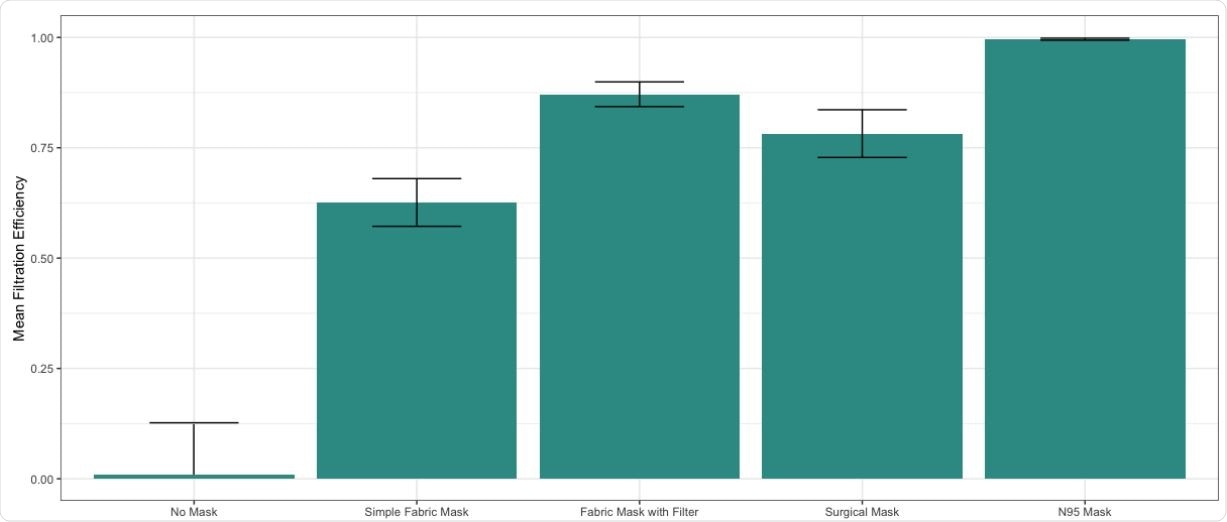As the coronavirus disease (COVID-19) rages worldwide, governments and health agencies are urging the use of facemasks to mitigate the spread of the severe acute respiratory syndrome coronavirus 2 (SARS-CoV-2).
Previous studies have shown that wearing face masks helps reduce the spread of infectious respiratory pathogens, including SARS-CoV-2. However, there is limited data that explores the efficacy of homemade fabric face masks.
In a new study, published on the pre-print server medRxiv*, researchers at the University of Cambridge found that fabric face masks block 62.6 percent to 87.1 percent of fine particles, making them useful tools in the battle against the COVID-19 pandemic.

 *Important notice: medRxiv publishes preliminary scientific reports that are not peer-reviewed and, therefore, should not be regarded as conclusive, guide clinical practice/health-related behavior, or treated as established information.
*Important notice: medRxiv publishes preliminary scientific reports that are not peer-reviewed and, therefore, should not be regarded as conclusive, guide clinical practice/health-related behavior, or treated as established information.
Face masks for protection
When the coronavirus outbreak first erupted in China in December 2019, the world faced a new global health threat. As the cases skyrocketed and the virus spread to many countries, health agencies recommended using face masks to protect oneself from infection.
Many people were first reluctant to wear face coverings. However, many studies have shown the benefits and importance of wearing one, especially when going to public places and indoor spaces with poor ventilation.
The World Health Organization (WHO) recommends that health workers use medical-grade facemasks, anyone who is feeling unwell, and those awaiting COVID-19 test results. Medical acemasks are also recommended for high-risk groups, like older adults and people with underlying medical conditions. Non-medical or fabric masks can be used by the general public.
Meanwhile, the U.S. Centers for Disease Control and Prevention (CDC) urged the public to use masks, specifically non-valved multi-layer cloth masks, to prevent the transmission of SARS-CoV-2.
Masks are intended to reduce the emission of virus-laden droplets, this is especially vital for asymptomatic and pre-symptomatic infected people. Multi-layer cloth masks help block the exhaled respiratory particles into the environment.
Further, the health agency emphasized that these masks reduce the inhalation of infected droplets from other people. The masks can reduce exposure to infectious droplets through filtration.

Comparison the mean filtration efficiencies measured for four mask types: a simple two-layer fabric mask, a more sophisticated mask with panels to cover the nose and chin and a PM2.5 filter, a standard surgical mask and an N95 mask. Error bars indicate standard deviation above and below the mean. To accurately compare the state of not wearing a mask, a special headpiece was designed to hold the mask sampling tube the same distance from the mouth as it would be when a mask was worn.
Are fabric face masks effective?
Since the beginning of the pandemic, a key concern from the public is to what degree their face masks protect against small particles. While the wearing of face masks is mandated or advised in many countries, there is limited information and studies on the effectiveness of non-medical grade masks in preventing SARS-CoV-2 transmission.
Recommended masks for health workers, such as N95, FFFP3, and other hospital-grade masks, are tested on each individual to ensure they can block a high percentage of particles. On the other hand, non-medical grade masks, such as surgical and homemade fabric masks, have no ratings to provide wearers information on how well they filter fine particles, including virus-laden droplets.
To determine how well fabric masks protect the wearers, the researchers conducted two methods in the study. First, they performed quantitative fit testing of various face masks with a TSI 8038+ machine to indicate their efficacy. Second, they conducted a survey of 710 residents in the United States about their perceptions of face mask effectiveness.
The masks tested in the study included the N95 mask, surgical mask, and two fabric face masks, which were tested on an individual 25 times each using the machine. The survey was distributed by Qualtrics XM, asking the participants to estimate their perceived efficacy of the four masks tested.
The study findings showed that non-medical grade masks effectively blocked more than 50 percent of airborne particles. The simple fabric masks blocked between 50 percent and 75 percent of the particles. The filtration ability of the fabric masks differs markedly based on the design of the mask.
A simple two-layer thin cotton fabric masks blocked an average of 62.6 percent of particles, while the more sophisticated fabric masks with panels to cover the nose and chin and a PM2.5 filter blocked an average of 87.1 percent. Meanwhile, the N95 masks widely used in medical settings blocked about 99.6 percent of particles.
In the survey, the researchers found that 78 percent of the respondents believed N95 protects by filtering over 50 percent of particles. Only 29 percent believed the masks protected from over 95 percent of particles. The participants graded fabric masks as the least effective, with 43 percent believing they filtered less than 50 percent of particles.
“Overall, our results suggest that even simple fabric masks may be able to protect the wearer from fine particles the size of the SARS-CoV-2 viral particle. In doing so, these findings add to the growing body of evidence suggesting that mask-wearing may play an important role in the global response to the COVID-19 pandemic,” the researchers explained.
The study supports the advisory from several health agencies recommending the general public to use fabric face masks to protect themselves from SARS-CoV-2 infection.
To date, there are more than 104.2 million cases of COVID-19, with over 2.26 million deaths worldwide.

 *Important notice: medRxiv publishes preliminary scientific reports that are not peer-reviewed and, therefore, should not be regarded as conclusive, guide clinical practice/health-related behavior, or treated as established information.
*Important notice: medRxiv publishes preliminary scientific reports that are not peer-reviewed and, therefore, should not be regarded as conclusive, guide clinical practice/health-related behavior, or treated as established information.
Source:
Journal reference: